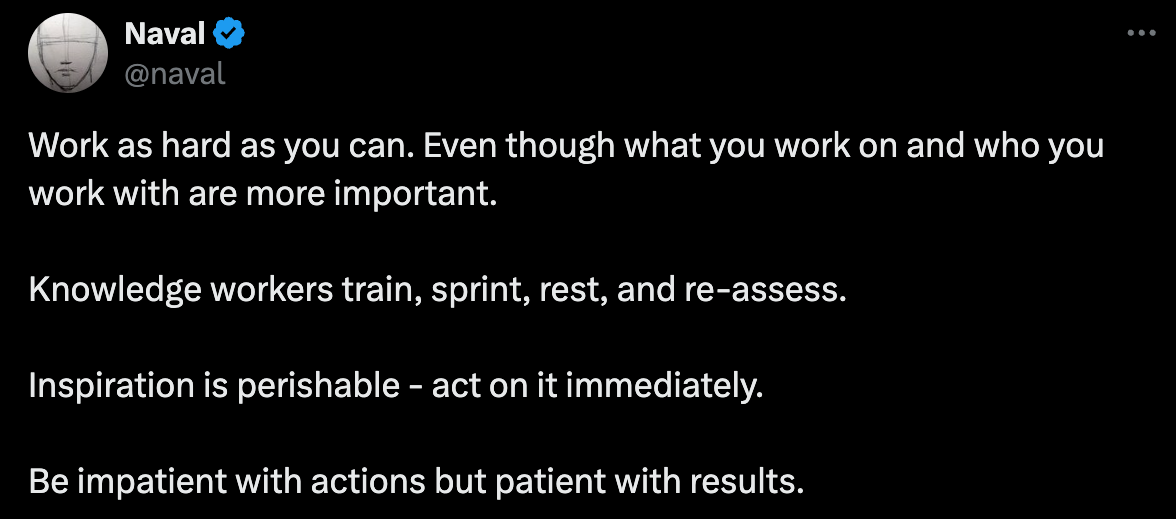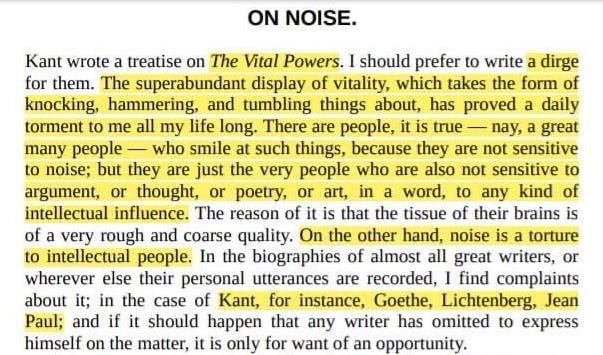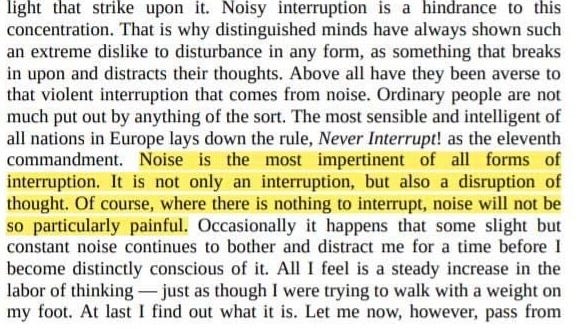Gentlest of Readers,
The present writer once found himself in an office job at a university which required a fair degree of ‘busy work.’ I used to clock in around 8am, have a few meetings, teach some students, write some papers and…that was about it.
The problem was that, since intellectual work occurs in sprints (and this work was intellectual, even if very much watered down), it didn’t really make sense to work from 9-5 in such a way.
I would therefore find myself working in spurts of energy and smashing out a paper, and then wanting to rest for a while or do something else. The problem was that it would then be 11am, and I would be sitting in an big open plan office with three or four others. It was not socially acceptable to just leave the building and go for a walk, nor was it appropriate to read the book I had stowed in my bag (The Weaver’s Grave, by Seumas O’Kelly) – that would have to wait until lunchtime.
The others in the office were habitually working on their computers. I was genuinely curious as to what they were doing. After a while, I learned that they were always sort of working, just very slowly, and had perhaps subconsciously learned to stretch their work over the course of the day. Or else they would do their work and then spend time going over the finer details and looking into related topics.
I am not sure. I know only that they had greater stamina than I had, and greater appetites for clicking, typing and scrolling. I had done enough of that, and wasn’t ready to do more just yet. I therefore saw no other course of action other than…to pretend to work.
Big Cat Training
Knowledge workers are a bit like sprinters.
If you are training for the 100m dash (I actually used to train as a sprinter), you actually do quite low-volume but high intensity work. On a given day, you might only run for 50 seconds, or 4 runs of about 12.5 seconds each, as an example.
If you go on long jogs, it will actually be detrimental to your fast-twitch fibres and to the sprinter’s mitochondrial system. And so, you must train and run the same way which the big cats of the Serengeti run – very rarely, but very fast when they do.
Intellectual workers, or anybody who basically has to think or create in a meaningful way in their job, are the big cats of the office. Mostly, you should be lazing around, growling occasionally, and resting. When you burst into life, however, it will be a sight to behold.
Sensitivities
I don’t see myself as any better than the others in that office. Many were competent and friendly people, and many were very intelligent. They also enjoyed their work. I guess, in every job, there is a component of self-selection, where those who enjoy the work end up persisting with it.
The reality is that we all work differently, and it shouldn’t matter how we work, as long as we get work done. Many ‘creatives’ (shudder) are a little allergic to the conventional arrangement.
All of us soft, temperamental and highly-sensitive persons are finely tuned beings who can only operate under certain conditions, at certain times of the day. Personally, I am easily irritated by minor perturbations, particularly of the auditory variety, which puts me in good company, as Schopenhauer seemed to suffer from the same ailment.
“I have long held the opinion that the amount of noise that anyone can bear undisturbed stands in inverse proportion to his mental capacity and therefore be regarded as a pretty fair measure of it.” – Schopenhauer.
Not satisfied with this excellent quote, Schopenhauer also doubled down on his annoyance at disturbance.
I wonder how long poor old Arthur would have lasted in a modern office. He problem would have headed for the exits even more quickly than me.
I was about five minutes in the job before I considered quitting, having found, ironically, that pretending to work is actually much more tiring than working.
It requires a certain know-how, and an ability to concentrate on a meaningless screen, or on that sneaky book you are secretly reading, while simultaneously looking over your shoulder and listening for the approach of some kind of middle-manager. Then, when somebody asks you what you have been doing, you will have to fabricate certain context-appropriate bullshit factoids.
The Enshittification of Work
The home office, which had not yet arrived, would be to my advantage. However, over ten years since David Graeber’s Bullshit Jobs article, and now in the era of remote work, I feel justified in saying that the state of modern work has since deteriorated. Remote work in and of itself is a step forward, but it comes with many drawbacks too. What I see happening now is the emergence of remote busy work, of employees having to click on silly boxes and scroll through documents even from home, all part of a kind of Total Work ethos which has been slowly saturating our corporate environments in the last few years. Surveillance software and box ticking exercises have taken over the responsibility of the manager looking over the shoulder.
I wouldn’t have lasted long at my old university job, if circumstances hadn’t intervened. I came home every day in a state of nervous exhaustion, dreaming of the home office which, unbeknownst to me, was soon to materialise, and would be to my advantage.
The home office would be to my advantage. However, over ten years since David Graeber’s Bullshit Jobs article, I feel justified in saying that the state of modern work has since deteriorated. What I see happening now is the emergence of remote busy work, of employees having to click on silly boxes and scroll through documents even from home, all part of a kind of Total Work ethos which has been slowly saturating our corporate environments in the last few years.
This Total Work environment seems hell bent on either making us work or making us, at least, seem like we are working.
In any case, after a month in my job those years ago, I was rescued by an unlikely savour – the famous RNA virus which sent us all packing out of the office so that, in the end, I was left in peace to ‘work’ from home, delighted by this development, in spite of the fact that it seemed like the world was ending at the time, when in reality a whole new world was beginning.
Thank you for reading my little story above. Subscribe to my newsletter if you enjoyed it.
Affiliates: I recommend the Supernote e-ink device, which I use for reading, writing, and annotating documents. This affiliate link is only valid for EU customers.
You can also support me by joining the Pathless Path Community, a cozy online space hosted by Pathless Path legend Paul Millerd. We hang out there to support each other and to find ways to live and work in the most authentic way – join us!








Random question: where does the term “gentle reader” come from? I love it and am just curious if there’s a story there.
Very relatable. Reminds me of a friend who walked out of an interview with a dream employer after seeing their open-plan office. He calls standard knowledge work 'pressing on a plastic block for eight hours a day.' Being less assertive myself, a lot of my productive output has been lost to society forever.